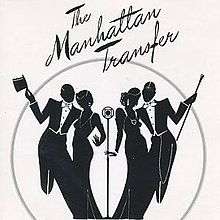The Manhattan Transfer (album)
The Manhattan Transfer is the second album by The Manhattan Transfer. However, it is the first of four albums to be released by the lineup of Tim Hauser, Laurel Massé, Alan Paul, and Janis Siegel, and the first to establish the sound and style for which the group would become known. It was released on April 2, 1975 by Atlantic Records and was produced by Ahmet Ertegün and Tim Hauser.
| The Manhattan Transfer | ||||
|---|---|---|---|---|
 | ||||
| Studio album by | ||||
| Released | April 2, 1975 | |||
| Studio | Atlantic Studios, New York City. | |||
| Genre | Jazz | |||
| Label | Atlantic/WEA | |||
| Producer | Ahmet Ertegun, Tim Hauser | |||
| The Manhattan Transfer chronology | ||||
| ||||
This incarnation of the group had been together for three years before this album was released. Ertegün, founder and chairman of Atlantic, attended one of their performances at the New York City cabaret Reno Sweeney. He offered them a contract, which they accepted.
Reviews
| Review scores | |
|---|---|
| Source | Rating |
| allmusic | |
Shaun Considine reviewed the album in May 1975 for The New York Times:
- "Vocally, The Manhattan Transfer is one of the slickest group's on today's market. Their intro number, "Tuxedo Junction", is a precise recreation of the 1940 Glenn Miller oldie, with the group's four part vocal harmonies and jazz riffs supplanting the Miller instrumentals. They have done their homework; they have studied their old 78s in detail. In the honors section, "Blue Champagne", a Dorsey beauty, and "Candy" evoke all of the magic and hazy charm of the 30s and 40s."
Charts
The Manhattan Transfer debuted on Billboard's Top Pop album chart on May 3, 1975, reaching #33.[2] The single "Operator" went to #22 on Billboard's Hot 100 singles chart.[3]
"Tuxedo Junction" reached #24 on the British pop charts.
Track listing
- "Tuxedo Junction" (3:01) (Erskine Hawkins, William Johnson, Buddy Feyne, Julian Dash) [4]
- "Sweet Talking Guy" (2:25) (Doug Morris, Elliot Greenberg)[5]
- "Operator" (3:09) (William Spivery)[6] (derived from "Operator, Operator" by Sister Wynona Carr)
- "Candy" (3:26) (Mack David, Joan Whitney, Alex Kramer)[7]
- "Gloria" (2:57) (Esther Navarro)[8]
- "Clap Your Hands" (2:55) (Ira Newborn, The Manhattan Transfer)[9]
- "That Cat Is High" (2:53) (J. M. Williams)[10]
- "You Can Depend on Me" (3:30) (Earl Hines, Charles Carpenter)[11]
- "Blue Champagne" (2:21) (Frank Ryerson, Grady Watts, Jimmy Eaton)[12]
- "Java Jive" (2:44) (Milton Drake, Ben Oakland)[13]
- "Occapella" (3:04) (Allen Toussaint)[14]
- "Heart's Desire" (2:36) (Hugh X. Lewis, George Cox, James Dozier, Ralph Ingram, Bernard Purdie)[15]
Personnel
- Tim Hauser – vocals, vocal arrangements, arrangements (2)
- Laurel Massé – vocals, vocal arrangements, tambourine (2, 6)
- Alan Paul – vocals, vocal arrangements
- Janis Siegel – vocals, vocal arrangements
- Mike Rod – tenor sax solo (1)
- Michael Brecker – tenor sax solo (3)
- Zoot Sims – tenor sax solo (8)
- Don Grolnick – acoustic piano, electric piano (1, 3, 4, 6, 7, 9, 12), clavinet (2, 11)
- Richard Tee – organ (3), electric piano (11)
- Murray Weinstock – organ (2, 5)
- Jerry Friedman – guitar (3, 6, 11)
- Ira Newborn – guitar, musical director, conductor, arrangements
- Andy Muson – bass guitar (1–9, 11, 12)
- Roy Markowitz – drums (1–9, 11, 12)
- Daniel Ben Zebulon – congas (11)
- Gene Orloff – concertmaster (6, 12)
- Clarinets – Phil Bodner, Wally Kane, Seldon Powell
- Alto saxophones – Phil Bodner, Jerry Dodgion, George Dorsey, Harvey Estrin, David Sanborn, George Young
- Baritone saxophones – Lew Del Gatto, Wally Kane
- Tenor saxophones – Michael Brecker, Seldon Powell, Mike Rod, Frank Vicari
- Trombones – Wayne Andre, Garnett Brown, Paul Favlise, Mickey Gravine, Quentin Jackson and Alan Raph
- Trumpets – Randy Brecker, Mel Davis, Jon Faddis, Marky Markowitz, Bob McCoy, Alan Rubin, Marvin Stamm
Production
- Producers – Tim Hauser and Ahmet Ertegun
- Production Assistance – Geoffrey Haslam and Arif Mardin
- Engineer and Remix – Lew Hahn
- Additional Engineers – Geoffrey Haslam and Gene Paul
- Art Direction – Bob Defrin
- Artwork – Fred Eric Spione
- Liner Photo – David Gahr
- Management – Aaron Russo
References
- allmusic review
- The Manhattan Transfer: Billboard Albums
- The Manhattan Transfer: Billboard Singles
- Atlantic Album, 1975, SD 18133, (entered by Joe Cox on 14Nov2010, Stumpjumper27695)
- Atlantic Album, 1975, SD 18133
- Atlantic Album, 1975, SD 18133
- Atlantic Album, 1975, SD 18133
- Atlantic Album, 1975, SD 18133
- Atlantic Album, 1975, SD 18133
- Atlantic Album, 1975, SD 18133
- Atlantic Album, 1975, SD 18133
- Atlantic Album, 1975, SD 18133
- Atlantic Album, 1975, SD 18133
- Atlantic Album, 1975, SD 18133
- Atlantic Album, 1975, SD 18133
References / Sources
- The Manhattan Transfer Official Website
- Retrieved from discogs February 1, 2011